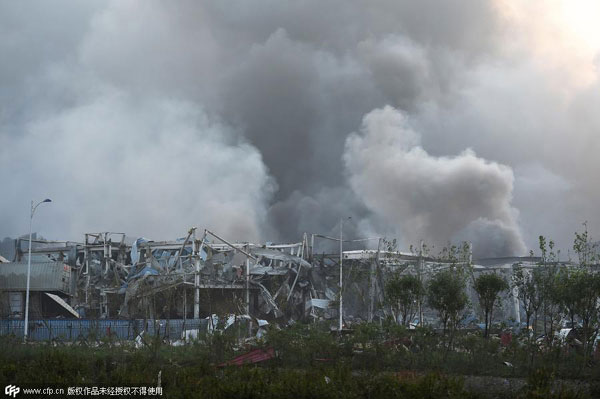|
 |
|
Smoke billows from the site of an explosion in Tianjin, August 13, 2015. [Photo/CFP] |
TIANJIN - The son of a former police official and a former state company executive are top shareholders of a dubious company whose warehouse exploded on August 12 in Tianjin, exclusive interviews by Xinhua have uncovered.
Xinhua gained access to executives of Tianjin Rui Hai International Logistics Co. Ltd, including company head Yu Xuewei, deputy head Dong Shexuan, general manager Zhi Feng and vice manager Cao Haijun. All are currently in police detention.
Interviews and cross-checking uncovered false ownership.
Li Liang is listed as the major shareholder of the company. But Yu Xuewei, a 41-year-old former executive at a state-run chemical company, confirmed he was the actual owner and holds 55 percent of the shares through his cousin Li.
Dong Shexuan, a 34-year-old man, holds 45 percent of the shares through his schoolmate Shu Zheng.
Dong is the son of Dong Peijun, a former police chief for Tianjin Port who died in 2014.
"I had my schoolmate hold shares for me because of my father. If the news of me investing in a business leaked, it could have brought bad influence," Dong told Xinhua.
Before setting up the company in 2012, Dong sold tires, cosmetics and wines.
Yu Xuewei, who had been the deputy manager of the Tianjin Branch of China's state-run Sinochem Group, was travelling with his family in Hebei Province, when the blasts occurred on Aug. 12.
"I met Dong Shexuan during a dinner party in 2012. His father was police chief and he was well connected in the port," Yu told Xinhua.
Rui Hai's management, including general manager Zhi Feng, who was injured in the blasts, had worked for Yu at Sinochem before Rui Hai was founded.
Yu said he and Dong planned to capitalize on their connections by establishing a logistics company, which they did on November 28, 2012.
These connections are thought to have facilitated their business by helping them obtain various fire safety, land, environmental and safety certifications.
"My guanxi (translated as connections) is in police and fire. When we needed a fire inspection, I went to meet with officials at the Tianjin port fire squad. I gave them the files and soon they gave me the appraisal," said Dong.
Dong did not specify whether there was a bribe or official misconduct.
Zhu Liming, deputy head of the planning and land management bureau at Binhai New Area, which granted the land and construction license for the warehouses, said his bureau "referred to the fire safety documents, which had given the green light in terms of whether the warehouse was a safe distance from the residential area".
China stipulates that dangerous warehouses must be 1,000 meters from major transport hubs and public buildings, but the warehouse was only 560 meters away from the Vanke residential community and 630 meters from a rail station.
Suspicion also surrounds other documents from the company, which are very likely to have been skewed.
"The first safety appraisal company said our warehouses were too close to the apartment building. Then we found another company who got us the documents we needed," Dong said.
Meanwhile, from Oct. 2014 to June 2015, the company handled hazardous chemicals without a license.
"After the first license expired, we applied for an extension. We did not cease operation because we did not think it was a problem. Many other companies have continued working without a license," said Yu Xuejun.
The State Council, China's cabinet, has set up a panel to investigate the accident, which has killed 114 people so far. The team will "define the nature and gravity of the accident, and determine liability," according to the statement.
The investigators will also advise which punishments should be given.
